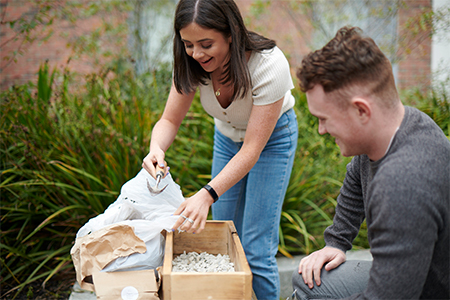7 ways volunteering can support your wellbeing
I know from my own experience that volunteering makes you feel good. In a recent ‘Time Well Spent’ survey by the National Council for Voluntary Organisations (NCVO), 75% of volunteers said that their volunteering experience helped improve their mental health and wellbeing.
So, if you’d like to make a difference and feel good at the same time, you might want to look into volunteering.
What is volunteering?
Volunteering means giving your time and effort without being paid, in order to benefit a cause or charity you believe in.
You might offer to help out at a food bank, be part of a working group to clean up a canal, coach a local sports team or join a campaign to tackle anything from period poverty, mental health or racism to climate change.
Volunteering can be something you organise yourself, or it can be organised by a charity, a university, a group or a club. It might be face-to-face or online, for example offering support on the phone or via a website.
According to the Community Life survey, in 2021-2022, 16% of the UK population volunteered at least once a month.
How volunteering can help your mental wellbeing
“There are all sorts of reasons why people volunteer. Some people choose to volunteer because they want to use their time, energy and skills to make the world a better place, or because it will look good on their CV” says counsellor, Gemma Campbell.
“But once they get involved, they often discover a whole variety of different ways that volunteering can support their mental wellbeing too.”
Here are seven ways that volunteering can help you feel good about yourself and the world around you.
1. Get that feel-good feeling
“Doing something we enjoy can release all those lovely feel-good hormones that make us feel fuzzy inside,” says Gemma.
Research demonstrates that helping other people can boost your mood by activating the reward centre in your brain. This encourages the production of feel-good hormones such as serotonin, dopamine and endorphins, helping you to relax and reducing your stress levels.

2. Feel part of something important
It’s a brilliant feeling when you get together with other people behind a common cause. You’re lifted up by the crowd and you’re far less likely to feel isolated or alone.
“When you’re volunteering with a group of people, it gives you a sense of belonging because you’re with others who share your values,” says Gemma.
3. Make friends in your local area
It’s not surprising that in the ‘Time Well Spent’ survey 68% of people said that volunteering helped them feel less isolated. This was even more true for younger people, with 77% of 18-24 year olds agreeing that volunteering made them feel less alone.
If you’re volunteering face-to-face, you have a good chance of meeting new people and making new friends. This can help you feel more connected to people and reduce social isolation.

4. Learn new skills
“Volunteering gives you an amazing opportunity to enhance the skills you already have and to uncover new skills,” says Gemma. “You might get the chance to take up a leadership role or to organise an event, or you might receive some training relevant to your role.”
When you learn a new skill, it increases your self-esteem and boosts your confidence. It can help you to feel more optimistic and more willing to take a risk. A new skill might also open up fresh job opportunities or encourage you to consider a different career.
5. See life from another angle
“Volunteering can give you an insight into someone else’s life, which might give you a different perspective and help to distract you from your own problems,” says Gemma.
“If you’re volunteering at a food bank, you’ll understand more about the stresses facing the people who use that facility. Equally, if you’re a young person who’s visiting an elderly person, you might appreciate the challenges in their life while also benefiting from their advice and life experience.”

6. Escape the day-to-day
“We all have commitments and expectations connected to our everyday life, whether they involve work, study or family,” says Gemma. “When you’re volunteering, it can feel different, because you’ve chosen to step out of your everyday life and explore something you’re passionate about. This can be both relaxing, because you’re away from the usual stresses, and energising, because you’re focusing on a special interest.”
7. Develop your sense of purpose
“It’s only natural to want to spend time on activities that are meaningful to us,” says Gemma. “Through volunteering, we can discover more about what we believe is important. When we take time to think about which causes or charities we support and how we might make a difference, it helps us to define who we are and what we believe in. That can help us develop a sense of purpose, which is reinforced as we see the positive impact of our volunteering work.”
First steps in volunteering
Ask yourself:
- Which causes are you interested in (e.g. the environment, LGBTQIA+, animals, arts and entertainment, fitness and sport, children, older people, homelessness)?
- Which skills can you offer (e.g. admin, cooking, gardening, listening, sports skills, languages, teaching)?
- Do you want to volunteer alone or as part of a team?
- Which clubs, groups or charities are in your local area?
- How much time can you offer?
Explore volunteering:
- Under 30? See volunteering opportunities at Vinspired
- Look at the DoIt site
- Discover how young people are changing their world through the iwill campaign
- Search for local volunteering opportunities using the Get Volunteering website
- See where you could volunteer near you on the Royal Voluntary Service website

